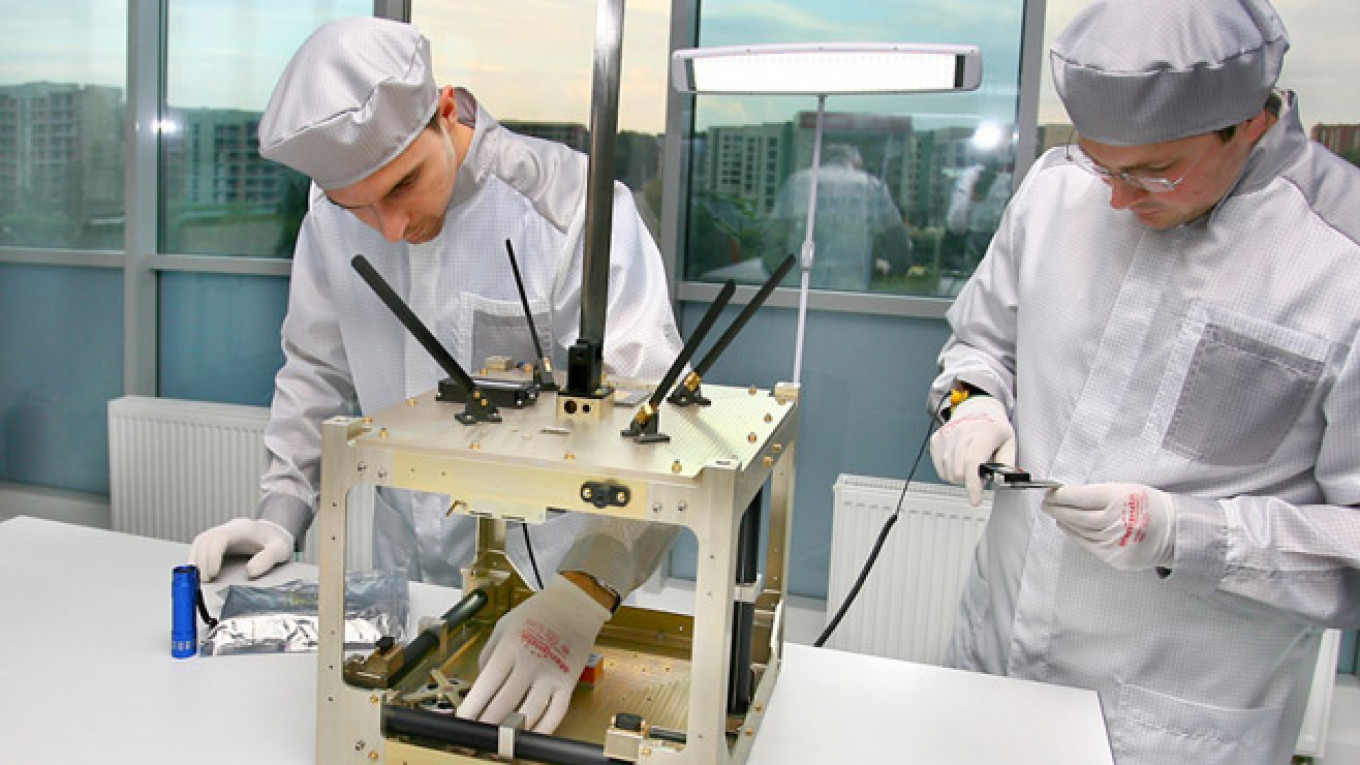Russia's first private commercial satellite company, Dauria Aerospace, has made the drastic decision to redefine itself as a space technology export firm in the face of low funding and tough U.S. competition, CEO Mikhail Kokorich told The Moscow Times on Tuesday.
"We are focusing on being an international company located in Russia that can export space technology and space solutions … and take advantage of the currently weak ruble," Kokorich said.
As part of its new mission, the company will now drop its U.S. and German offices. These offices, which focused on data processing, data mining and information distribution, were part of the firm's now canceled cloud computing service.
"Technology-wise, it's a pity. It was a difficult decision because we value our German and U.S. subsidiaries pretty highly — technology-wise — but this is the only solution we have now," he said.
The change marks a major shift from the company's original conception.
Kokorich founded Dauria in 2012 with the vision of deploying a vast network of small satellites to collect images and data of the Earth. This data, to be used by everyone from agricultural scientists to urban planners, would then be made available in nearly real time by means of a proprietary cloud-based computing platform.
After raising $10 million during Series A funding in 2012, Dauria drew the interest of I2BF Global Ventures, a venture capital firm specializing in investing in high-tech startups, which invested $20 million in 2013.
But with Russia's economy facing serious problems in the wake of sanctions, falling oil prices and the collapse of the ruble, it has become increasingly difficult to raise cash from Western investors. ?
"We decided to close the foreign branches because [our] strategy was … capital intensive," said Kokorich, "and recently we have been faced with a situation where capital markets have been closed off to Russian-owned companies."
Stiff Competition
Dauria's redefinition is also spurred by its increasing number of well-funded rivals, mostly from the United States.
"When we started we were one of the first companies in the world who [wanted to do this], and we had some success last year when we launched our first three satellites," Kokorich said.
At 36 years old, Kokorich fulfilled a lifelong dream of contributing to space exploration when he founded Dauria, which he financed by selling two home goods and appliance chains that he had founded.
Kokorich's backstory played well with Western investors, who saw in him a Russian Elon Musk — the Silicon Valley entrepreneur who made billions off internet payment service PayPal, and used his fortune to launch SpaceX and Tesla Motors.
But then competition in the small-satellite applications market began to heat up.
With the global satellite market as a whole raking in $195 billion in 2013 according to the Satellite Industries Association, other Silicon Valley startups such as Skybox and Planet Labs were working to secure the funding needed to complete similar projects.
Last year, Google purchased Skybox for $500 million, and Planet Labs recently reported raising $95 million from investors in its latest round of financing.
Change of Plans
Now Dauria plans to survive by doing what Russia's poorly funded federal space industry has done for decades —? export hardware to the West.
Back home in Russia, Dauria stands out from its peers in that it is one of the few internationally recognizable space firms that is not state-owned.
Most of the industry has been in a state of protracted crisis since the early 1990s, and various efforts to reform and repair the industry have fallen flat.
Last month, a complete consolidation of the entire industry under a soon-to-be-created state corporation was approved by President Vladimir Putin.
But while the industry experiences a process of re-Sovietization, Kokorich said that Dauria's main area of interest remains in the private market.
"We would like to be on the private market and deal mostly with private companies by selling satellite systems and participating in several programs," he said. "We have several contracts with the Russian space industry … but we do not want to have predominantly government contracts."
Contact the author at [email protected]
A Message from The Moscow Times:
Dear readers,
We are facing unprecedented challenges. Russia's Prosecutor General's Office has designated The Moscow Times as an "undesirable" organization, criminalizing our work and putting our staff at risk of prosecution. This follows our earlier unjust labeling as a "foreign agent."
These actions are direct attempts to silence independent journalism in Russia. The authorities claim our work "discredits the decisions of the Russian leadership." We see things differently: we strive to provide accurate, unbiased reporting on Russia.
We, the journalists of The Moscow Times, refuse to be silenced. But to continue our work, we need your help.
Your support, no matter how small, makes a world of difference. If you can, please support us monthly starting from just $2. It's quick to set up, and every contribution makes a significant impact.
By supporting The Moscow Times, you're defending open, independent journalism in the face of repression. Thank you for standing with us.
Remind me later.


